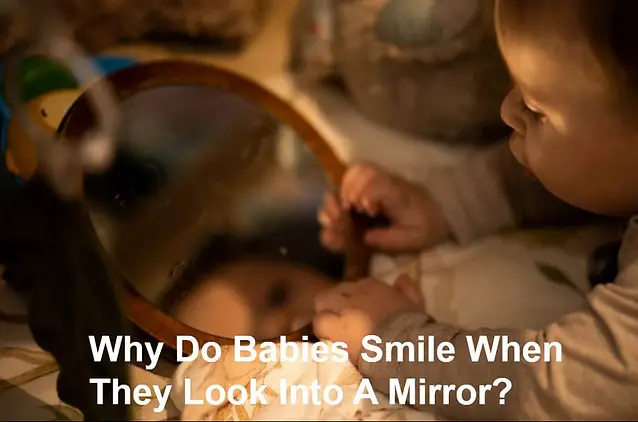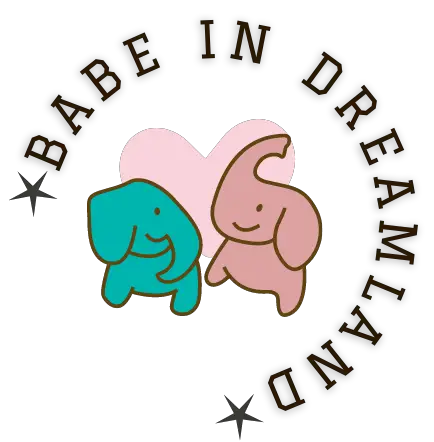Why Do Babies Smile When They Look Into A Mirror?

Have you ever wondered why your little tot looks into a mirror and smiles at her own reflection?
Is she aware that it’s her she sees? Why does she smile? And what goes through this sweet little head of hers?
Let’s find out the truth about babies and their interactions with mirrors.
Why Do Babies Smile When They Look In The Mirror?
It may be a relief to some of you to know that your child isn’t actually a self-obsessed narcissist. But for the majority, it may come as a disappointment to discover that your little bundle has no idea that she is looking at her own reflection in the mirror. Before that can happen, she must develop an awareness of her physical and mental states. Meaning – she needs to learn to think about herself as an independent, separate person from others. In the meantime, babies smile at their own reflection because they simply love looking at human faces – including their own, as well as making eye contact.
1. Babies Love Looking At Friendly Faces
Forget the high-tech, flashy electronic toys, even the high contrasts back and white shapes, rattles, musical boxes, etc.
Young babies much rather entertain themselves by gazing at human faces and making eye contact than play with toys. Hence their fascination with mirrors.
I will tell you more.
In fact, babies are particularly captivated by pretty female faces.
This discovery was made by scientists from the University of Exeter based on an experiment they performed on a group of newborn babies up to a week old.
So, the scientists have presented two photos to each infant – one of the conventionally attractive face and one of the plain-looking face.
The results of this experiment were astonishing.
It turned out that babies spend 80% longer looking at a pretty face rather than a less attractive one. However, it is still unclear where such preferences came from.
So next time you catch your baby fixated on your face – take it as a compliment???? clearly, your baby thinks you are pretty!
Secondly, babies are also strongly attracted to the faces they remember, such as those of their loved ones.
Although they can distinguish their mommy right after birth using other senses, like smell or hearing, it will take up to 3 months for them to learn the contours of her face. Or as soon as their vision gets a bit less blurry and fuzzy.
But coming back to the subject of babies smiling into their reflection…
So, when your baby sees her lovely little face in the mirror, she gets really excited. And the big toothless grin followed by cheerful cooing and babbling away – is her natural, spontaneous response to her mirror image. She may even try to reach for and touch her reflection in the mirror or give it a kiss ????
In other words, it is her first attempt at interacting, communicating, and enjoying the company of “the other little human” who looks and moves just like her.
That’s wonderful news. Because she is working hard to achieve a crucial milestone – interpersonal skills.
This leads me to discuss the benefits babies can get from interacting with mirrors.
2. Benefits of Mirror Exploration
A baby can gain many benefits from interacting with the mirror. Among them are:
- The development of visual senses.
- Encourage concentration and curiosity.
- When used in tummy-time, it helps grow muscles and stimulates physical development.
- It can even help with language development, listening, skills.
But in my humble opinion, most notably, it supports social and emotional development and self-awareness.
2.1 Development of Social And Emotional Skills
Gazing at her smiling and babbling reflection in the mirror is so much more than a fun thing to do for your little tot!
In fact, it is a sign that your baby is developing social and emotional skills by interacting and responding to her own image in the mirror.
Moreover, she learns how to focus on the object, track movement, copy facial expressions such as opening and closing her mouth or sticking her tongue out. And later – also understand the feeling behind different facial expressions.
Therefore, spending time in front of the mirror with your baby will stimulate her development and help her reach expected milestones. It is also a great way of bonding with family members.
So, go ahead and spend some time with your little one in front of the bathroom mirror.
Lots of fun for the whole family is guaranteed.
Here are some ideas on how to entertain your baby with mirrors:
PARENTS’ GUIDE TO MIRRORS WITH BABY
2.2 Development Of Cognitive Skills And Sense of Self
So, when does your little one actually recognise herself in the mirror?
Well, self-awareness is a complex skill, and it takes around 18 months for babies to master. It is not entirely clear to scientists why it takes them such a long time.
Babies need to realise that they have their own minds and consciences. And that their emotions may be different from people around them.
Baby’s understanding of this concept is also fundamental for forming a solid social bond rather than simple interactions.
With time, the baby will come to understand that the little friend she sees in the mirror is actually herself.
To demonstrate that babies can recognise themselves in the mirror, scientists from the University of North Carolina developed a “mirror test” in the early 70s.
It was a simple experiment. The infants between the ages of 6 to 24 months were placed in front of the mirror. They were each given a spot of lipstick on their noses. Then, the babies’ reaction to their reflection in the mirror was observed.
According to the results of this test, babies younger than 20 months do not show any interest in the spot. But the older group was genuinely intrigued by the lipstick, clearly pointing at it or trying to rub it off.
Their reaction suggests that they realised it was their own nose they saw in the mirror.
3. Final Few Lines
Babies are smiling and reacting with great enthusiasm to their own reflection because they are genuinely fascinated by human faces.
Especially the pretty ones and those belonging to their loved ones.
Interestingly, they have no idea that they are looking at themselves in the mirror. That’s because it takes around 18-20 months to become aware of their own individuality.
Even so, playing with mirrors is not only great fun for babies. It also helps them learn many crucial skills essential to their healthy development.
